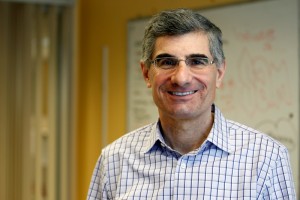News All News
July 3rd, 2014
Ask a Director: How do DBDs Work With Faculty?
Director of Business Development Sam Liss talks about a DBD's relationship with faculty.

Do you work with all faculty across the university?
Our team works with faculty across the entire University. Each of us works with faculty that align with our background. For example, I have an electrical engineering background, and have worked in both startups and established tech companies in the software, semiconductor and telecomm sectors. So my focus tends to be among the faculty working in those areas. I spend a lot of time meeting with faculty and postdocs to learn more about what they're working on. Some of the faculty are involved with very theoretical work. For example, on the top floor of the Department of Physics sit the string theorists. Their work is profoundly important, but is unlikely to have near-term commercial impact. At the other end of the spectrum, for example in the School of Engineering and Applied Sciences or within the Department of Chemistry and Chemical Biology, the faculty are working on research that is often less theoretical and more applied. Some of these ideas could translate into products with strong commercial potential. That's where I spend a great deal of my time. I'm working with the faculty who are working in research areas that could be the basis of technology that can have a practical application and true societal impact. We commercialize this technology and also work with our faculty to attract industry funding that could accelerate this research.
What is your primary focus when looking for new technology to commercialize?
It’s really quite simple. The essence of what we do is to really understand what's going on in each faculty member’s lab. We want to understand not only the nature of the research, but also understand the objectives of each faculty member. What’s important for them? What they are trying to achieve? That's the starting point and really drives everything we do.
How do you help faculty assess their IP?
Engaging with our faculty about new IP is one of the most interesting aspects of our job. It starts with a discussion that challenges them look at their research through a very different lens. We're not looking at it through the lens of whether there’s strong scientific merit to the work. We’re now looking at it purely from the perspective of whether this new idea could be the basis for a commercial product or perhaps a startup. That's a very different way of assessing their research. A whole new range of factors need to be considered: What problem is being solved and do we really understand the sometimes maddeningly subtle aspects of the problem? Can the product be manufactured cost effectively? What product is it displacing and are the benefits sufficiently large for consumers to really make the shift? The list goes on and on. But the way in which we figure all of this out is simple. We engage with the marketplace, talking with companies, entrepreneurs, venture capitalists and even consumers. That’s because the answers to these important questions lie outside the walls of Harvard.
Is it difficult for the faculty to approach their research from this angle?
The faculty love doing it. For those faculty that may not have much experience in this area, it’s a real learning experience. If they're writing an academic paper, they truly understand the bar for getting published. But the bar is completely different when it comes to whether the technology can be commercialized or whether this great idea can actually be patented. But like the scientific method, we develop a hypothesis and then go test it in the marketplace by collecting data. So while this is new territory, many of our faculty really enjoy the opportunity to engage with OTD to test the commercial potential of their idea.
If you have a question you would like to ask an OTD Director, please send it to .(JavaScript must be enabled to view this email address) or contact our office for personal assistance.
Press Contact: Kirsten Mabry | (617) 495-4157
